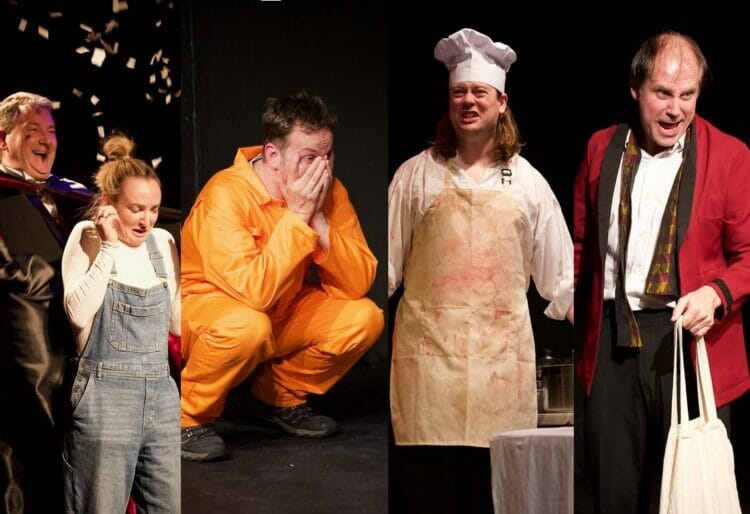PROGRESS Theatre’s annual showcase of home-grown writing talent is back with six new plays in Reading as WriteFest returns for its 17th year.
The show sees up-and-coming playwrights present short pieces which are then produced and performed at the venue in The Mount.
This year’s event kicked off with War Games, written by Liz Carroll and directed by Matthew Beswick.
Laurence McNaughton and Pixie Nash star as two young children, among a number of other incidental characters, who while away their hours in war-torn Britain by playing.
Straight off the bat the piece sets the tone for the rest of the vignettes, kicking into the initially carefree games of the characters.
This quickly descends into the exploration of the darker experiences of the children, including the prejudices of their parents and the depravities of other caregivers.
As such, the jovial tone serves only to reinforce the impact of the darker shades of the story, a theme which was front-and-center through much of the show.
The next short piece was Arthur Burke’s The Execution Chamber, directed by Tom Ripper, and starring Paul Gallantry, Neil Padgen, Flora Paulo, and Emma Kellow.
This story follows the execution of a man, but nothing is as it first seems as a dark twist is revealed and events quickly begin to unravel.
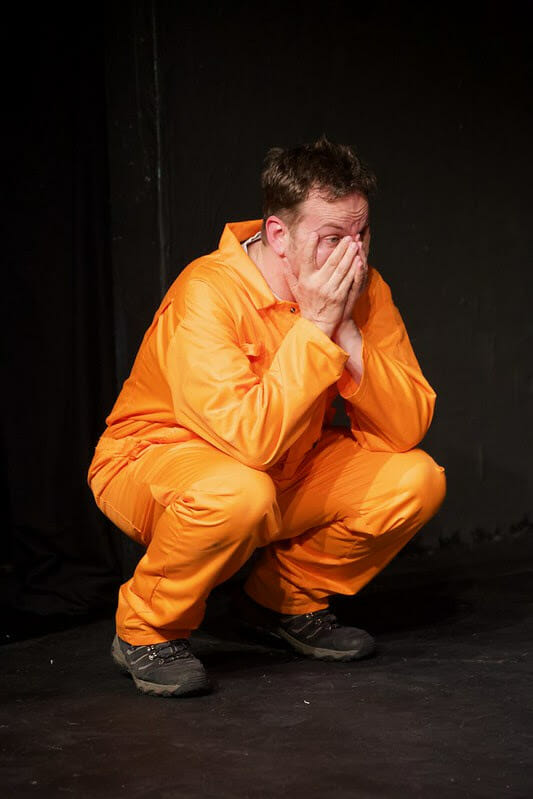
This piece plays out like a Black Mirror episode, with some interesting ideas wrapped up with affable humour, snappy pace, and a tense conclusion.
An electric chair forms the centrepiece of the play, with a particular highlight being when one character admits they’d “rather die,”– “Have a seat,” is the whip-smart response.
The third short piece, and the last of the first half, is The Debt, also by Liz Carroll and directed by Aidan Moran.
It stars Ali Caroll as the reclusive butcher Brenda with a dark past informed by the loss of her partner, who is questioned regarding the recent disappearance of her creditors.
Carroll’s portrayal of Brenda is excellent, with thinly veiled contempt for Sergeant Wainwright, and the police more generally, pervading through with a natural disdain.
The second half opens with the fourth short play, Melanie Roan’s exemplary piece, Lump.
Directed by Ali Howarth, it follows a woman’s journey with cancer after finding a lump, which is brought to life and becomes a character.
While Paul Gittus’ portrayal of Lump is well-placed, Emily Browne glows throughout with meticulously-observed humour and pathos as she grapples with mortality.
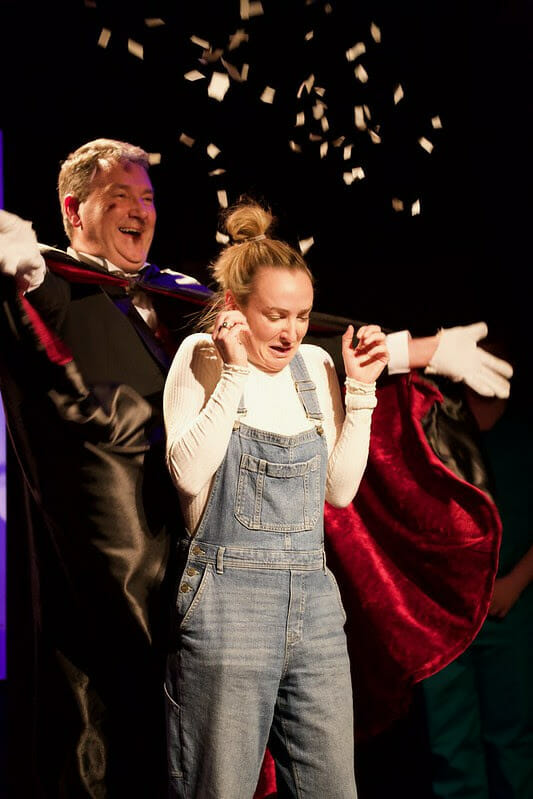
The heavy subject matter is tackled head-on and sewn through with levity and humanity, affording it maximum impact in both its serious and superficial discourse around cancer, forming a real highlight of the show.
Every second of the Lump is touching and thrilling in equal measure, in no small part due to the camp, arch-villain performance of Gittus and Browne’s expert pathos and humility.
Next up is Scotty, written by Phillip Mannion, directed by Ali Carroll.
Freddie Meader portrays sleek, attractive young actor Fancy, who catches the eye of the older, dishevelled luvvie Kit, played by Paul Gallantry, alongside Waitress Donna Collins.
Kit, washed up and heart-broken, schemes to score a free lunch from Fancy after a chance encounter, but finds himself lumbered with more investment, and more to spend, than he originally planned.
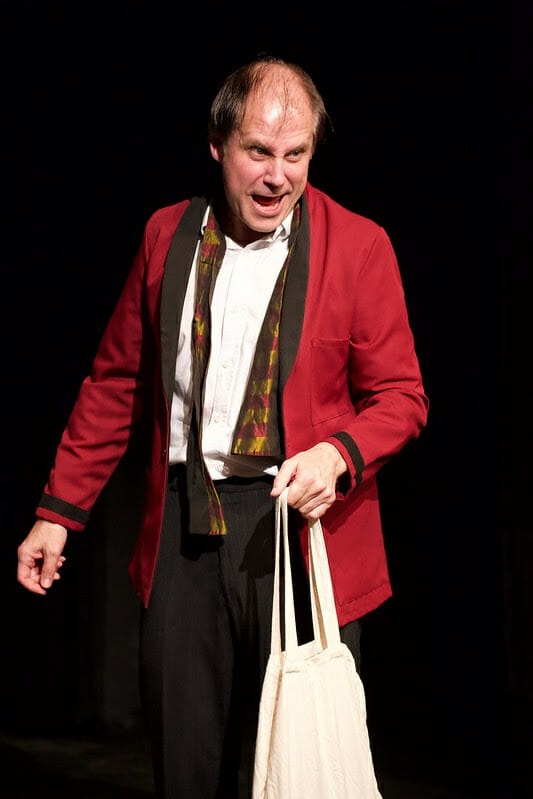
The Shakespearean discourse brings a levity and playfulness to the piece, as does a brief musical interlude well performed by Collins.
The sixth and final show is Adam Wells’ Pie, directed by Imogen Lilley, and starring Damien Passmore, Imogen Haley, and Juliet England.
Centering on two chefs who are tasked with hiding the bodies of their master’s enemies in the food for a fancy banquet, Pie begins starkly with the presentation of a well-stocked kitchen and a dismembered corpse.
While it doesn’t necessarily sound like the best starting point for comedy, the piece is laced-through with snappy, snarky one-liners, humorous argument, and sharp satire regarding what it means to be part of the hospitality industry.
Passmore’s head chef sparkles with effusive exasperation, excellently counterpointed by Haley’s slower, bumpkin-ish Steward.
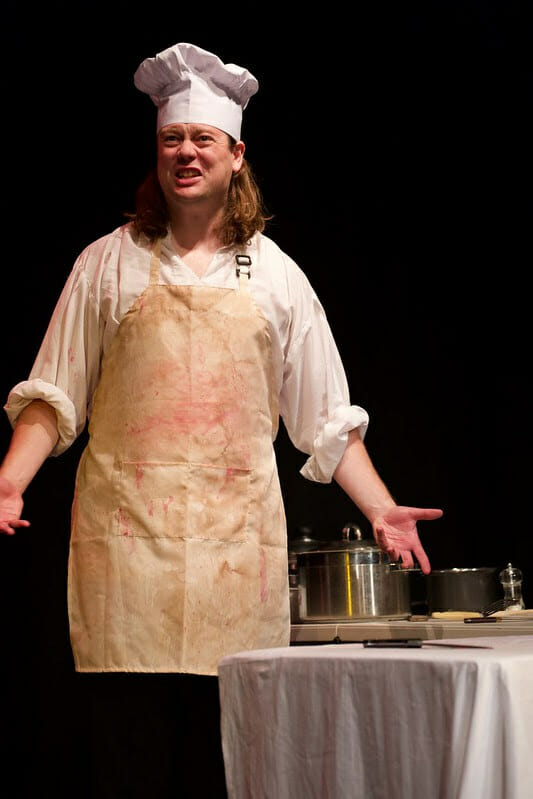
Overall, WriteFest 2023 sees six plays loaded with interesting ideas, promising premises, curious character performances, and well-observed writing.
WriteFest 2023 is taking place at Progress Theatre, The Mount, from Thursday to Saturday, September 27-30.
Tickets and more details are available via: progresstheatre.co.uk/2023-writefest



















